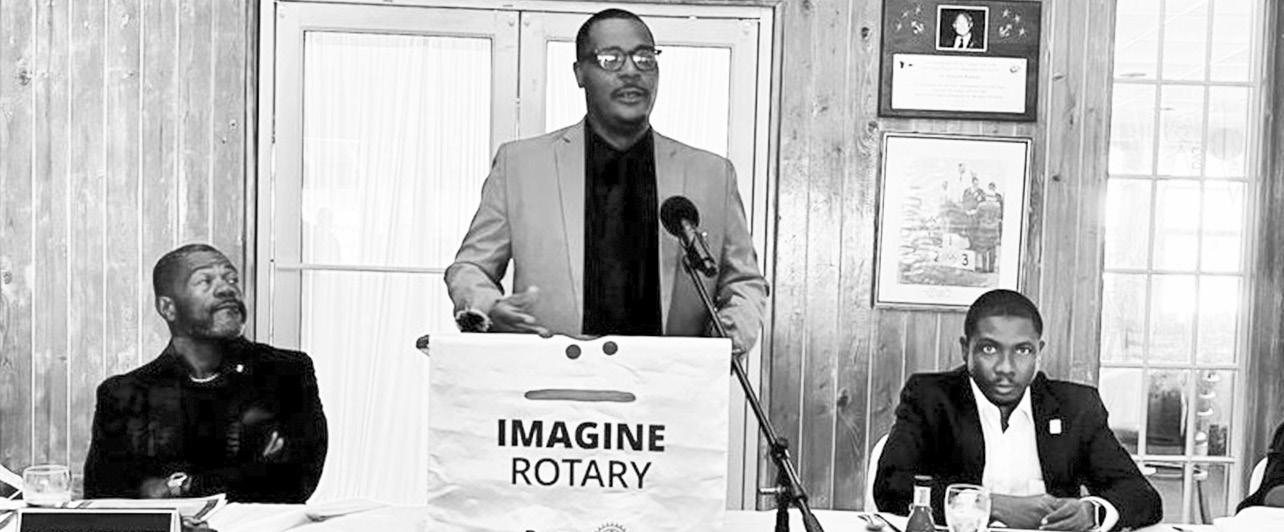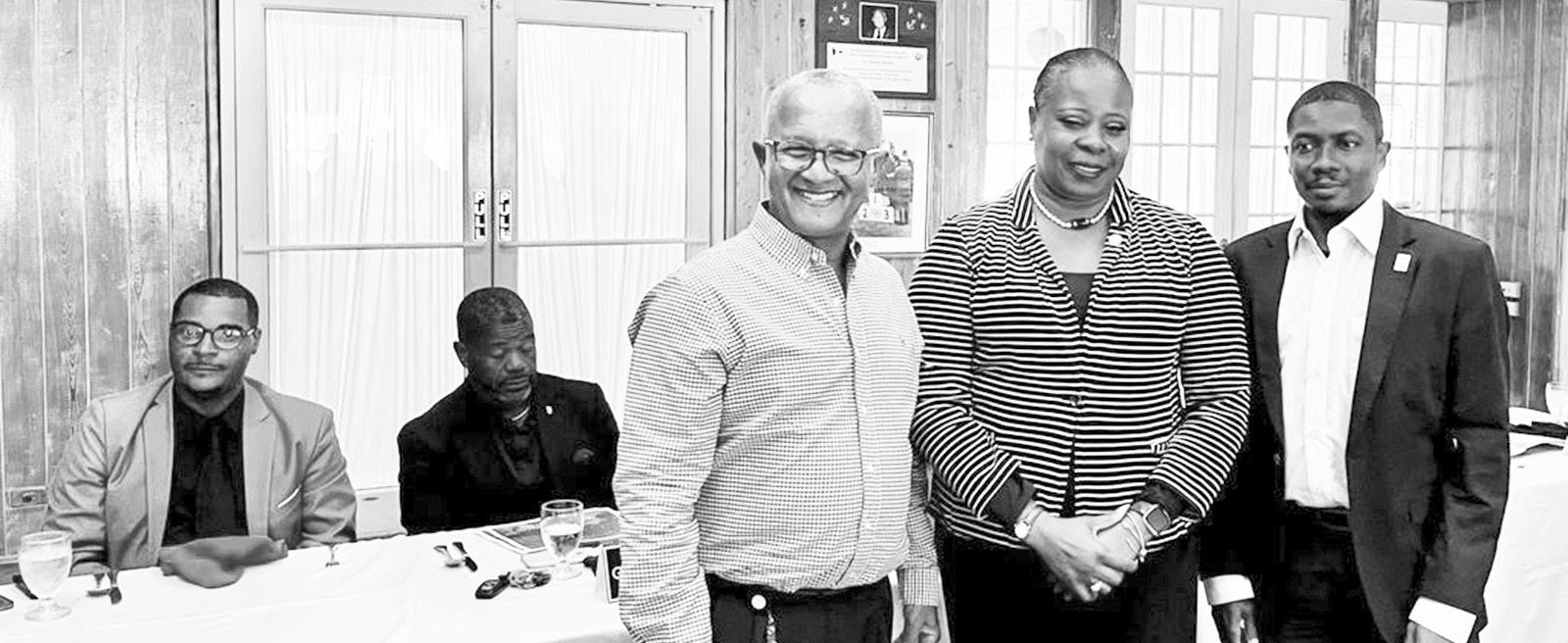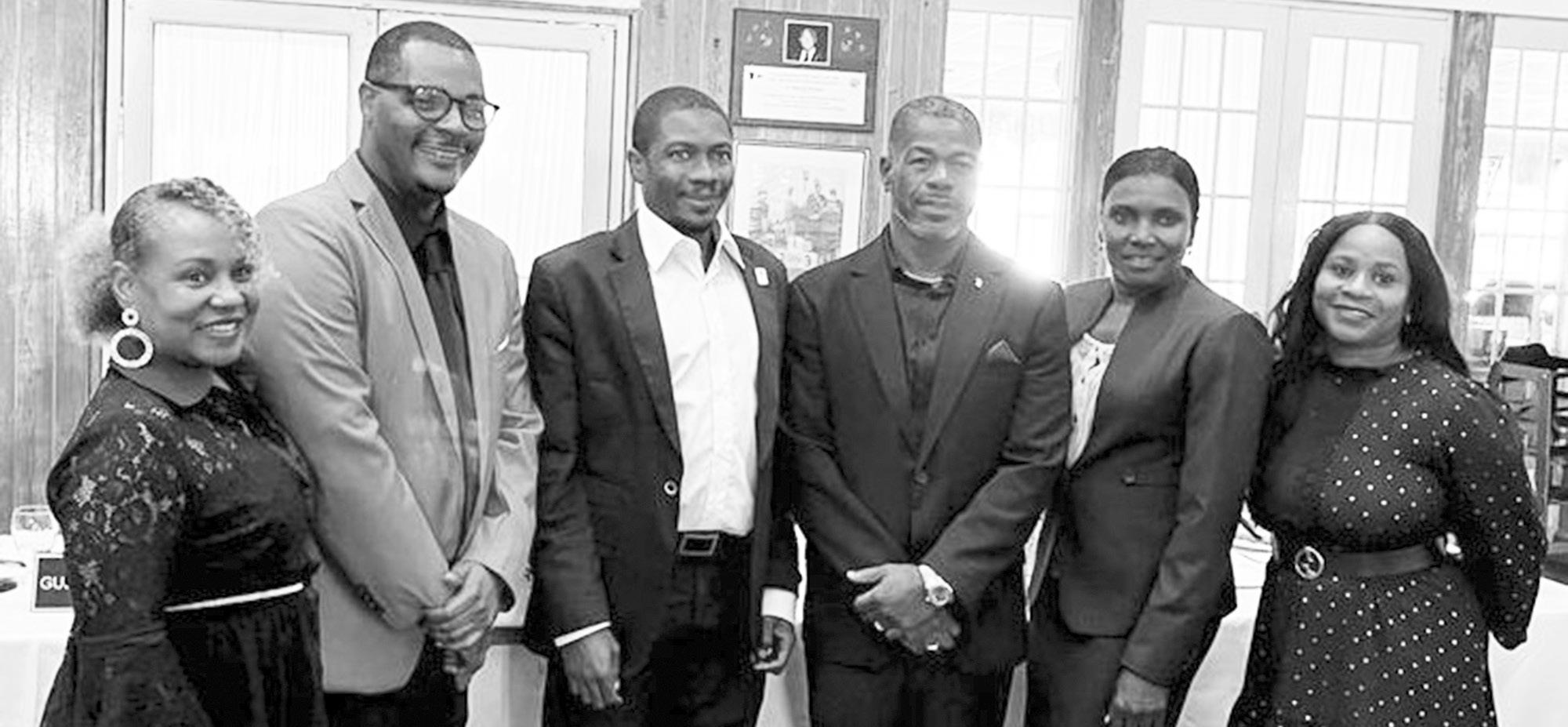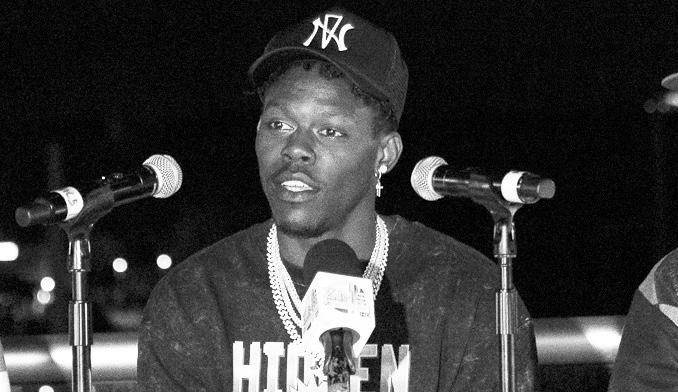
8 minute read
Rotarians urged to lend support to CARIFTA
LYNDEN Maycock, chairman of the Local Organising Committee for the 50th Golden Jubilee CARIFTA Games, said they would like nothing better than members of the Rotary Club of South East Nassau to lend their support and volunteer for the region’s greatest junior track and field competition over the Easter holiday weekend.
Maycock, assisted by senior director of technology Michelangelo Cartwright, made the pitch during the Rotary meeting on Wednesday at the Nassau Yacht Club.
Advertisement
A number of other members of the LOC were also present, including Pauline Davis, the Dame of the Games and Fern Hanna, the senior director of marketing and partnership.
Maycock was introduced to the meeting by Dr Bridgette Rolle, a member of the Bahamas Association of Certified Officials (BACO), who at the same time received her fifth Paul Harris pin in a ceremony that was presided over by past president Calnan Weech and president Johann Bain.

The Paul Harris pin is presented to Rotarians after 10 years of service or if you do exceptional
Polo
FROM PAGE 12
The Awutu Winton club has seven teams representing three regions of Ghana.
Players range in age from 7 to 25, and the league includes a group of about 20 women. It had 85 athletes and 10 coaches when it opened its new season last month in Ghana’s capital, Accra. Asante said most of his Ghana players had some knowledge of swimming when they joined the programme, but not in deep water, where the sport is played. “Treading water and how to handle the water polo ball was very difficult when I started playing,” said Ishmael Adjei, 20. “But as time goes on, I could see I am improving personally.”
Adjei’s club is part of San Diego-based Black Star Polo, an organisation founded by Asante that also works on creating aquatic opportunities for African and African-American communities in the United States.

“When I started playing, (my family) thought it was just a waste of time,” Adjei said, “because you had to help them do the family chores and you would take a timeout to go and have training ... but as time goes on, they are getting interested.”
JAZZ
FROM PAGE 12 was his second son because he was the first. “He’s grown up to be a man now, so I’m comfortable with him doing his thing out there,” Sands said. “I’m just happy for him and his family and the support that they give him. The same guys who were with him when he was 10-11 years old are still with him today. We’re like a family, who try to stay together.” voluntary work in the community, which depicts Rotary’s motto: “Service Above Self.” One of her pins came when she took a group of young people on a fact-finding mission trip to the United States.
For Cartwright, he’s tried to be the coach of reasoning.
Three of Rolle’s pins earned came as a result of being president of the Rotary Club of South East Nassau twice since she joined in 2014. The other came from her involvement in sports, in particular, as a member of BACO.
Any significant growth in Africa would be a welcome development for a sport that has wrestled with a lack of diversity for decades, much like aquatics in general. Even in the places where water polo is most popular — such as California, and parts of southern Europe — there are very few players of color.
Egypt and South Africa are the only African countries that have played men’s water polo at the Olympics. South Africa became the first women’s team from the continent to make it to the Games when it finished 10th in Tokyo in 2021. World Aquatics said it doesn’t have player participation figures broken down by ethnicity.
“I think it’s vital for the growth of our sport to break out of the normalcy that it’s been the last century, of traditional water polo nations,” said former U.S. player Genai Kerr, who serves on the board of the Alliance for Diversity in Water Polo. The second of three brothers, Asante got into swimming and water polo after his family became good friends with the family of five-time U.S. Olympian Jesse Smith.
Asante played college water polo at California Lutheran University and got his degree in psychology. He competed
“After Marlins game that we went to with Jazz, he said tomorrow I’m going to hit a home run or a slider. I said come on Jazz,” Sands said.
“The next game, first at bat, he hits a home run and gets a slider. He points up in the stands. So I guess I have to believe everything he says now.”
As a leading figure for the younger guys following in his footsteps, Sands said he’s confident that Chisholm will make an impact on the future of baseball in the Bahamas and hopefully he will get a professionally in Brazil and trained in Europe.
He often felt he stood out as a Black man.

“Just being used to everybody being able to see me and standing out,” he said, “and I’m the one everybody notices first, on every class, every team.”
It was different in Ghana, the birthplace of his father, Dr. Kofi Sefa-Boakye. Asante’s mother, Elizabeth, is from Los Angeles, and she met Kofi when they were students at the University of Southern California.
Asante started going to Ghana with his father after he graduated from high school. He often brought balls and caps on trips to visit family. In 2018, he reached out to the country’s swimming federation, and it held an event at Awutu Winton Senior High School — one of the only schools in the country with a pool — where it made a donation and promoted the program.
“What he’s doing is awesome, because it’s so difficult to start something from scratch,” Smith said.
A relatively small geographic footprint can put a sport at risk of losing its place at the Olympics, according to Victoria Jackson, a sports historian and clinical assistant professor of history at Arizona State University. But, Jackson said, decisions about what sports to include are hard to predict and reflect politics, relationships and subjectivity.
Jackson said an all-Black water polo team at the Olympics could have a profound effect on the sport.
“I mean, it’s that quote, right? ‘You can’t be what you can’t see,’” she said. “It’s immediately horizon expanding.”
That’s why Asante’s effort in Ghana has attracted attention in some prominent corners of the sport.
KAP7, a company that sells swimsuits and other water polo gear, has shipped over goals and other equipment. Kerr and five-time U.S. Olympian Tony Azevedo also have donated equipment, and former USA Water Polo high performance director John Abdou did a Zoom training session for referees. “This is something where everyone can see, hey look, this is happening,” said Wolf Wigo, a three-time U.S. Olympian, one of the co-founders of KAP7 and the men’s coach at UC Santa Barbara. “It’s not just one Black person in a pool with 12 white teammates, or two. It’s a whole pool full of all Black athletes, all playing water polo, having a great experience.”
Asante — whose full name is Prince Kofi Asante
Russians and Belarusians should not face discrimination just for the passport they hold. Instead, they could compete under a neutral flag.
That view has been challenged in recent days by two Ukrainian medallists at the Tokyo Olympics, tennis player Elina Svitolina and high jumper Yaroslava Mahuchikh, and by boxer Wladimir Klitschko, who took gold at the 1996 Atlanta Olympics. They want a total ban on Russia and Belarus from Paris.
Olympic officials in Ukraine have warned they could boycott Paris and are meeting today to discuss it.
“It is extremely regretful to escalate this discussion with a threat of a boycott at this premature stage,” the IOC said yesterday.
Olympic officials in Latvia and Poland are also threatening a boycott, and those countries were joined by Estonia and Lithuania in a statement yesterday by sports ministers which suggested the sports debate was being used “as a distraction from the illegal aggression against Ukraine.”
“It is natural that there are dissenting voices coming mainly from neighbouring countries of Ukraine, given their specific situation,” said the IOC, whose Olympic Charter obliges the 206 national Olympic bodies to send a team to the Summer Games.
At the White House on yesterday, press secretary Karine Jean-Pierre said the United States had “worked to hold Russia accountable for the brutal and barbaric war” before acknowledging the IOC’s position.
Sefa-Boakye — hustles to keep the project afloat, making the most of his connections in the sport and a GoFundMe page. But the way Asante sees it, he has already won.
He is helping promote water safety in Ghana and his native Southern California, a major issue for Black communities. He helped teach swimming lessons to children of Somali refugees at a San Diego YMCA last year.
“I just wanted to play the game,” he said, “but now, I’m realizing this is an even bigger and important mission than just before.”
He also dreams of Ghana competing at the 2028 Olympics in Los Angeles. The most plausible route would run through the Africa continental qualification tournament, but the next step is likely some of Ghana’s players joining American college programs. Asante also said he plans to field an under12 team at a water polo festival in Italy in June.
Los Angeles looks like a long shot, but Asante has a plan — and he already has traveled a long way.
“My face is in front of a portrait, so I don’t see the full picture, so I’m able to compose myself,” he said. “But that would be literally bringing my two homelands together in LA, bringing Ghana to LA.” chance to display that pride when he teams up with them to play in the next professional baseball tournament at the new Andre Rodgers Stadium.
Bahamas Baseball Association president Sam Rodgers commended Chisholm, whom he has watched through his progress from the minor league to the major league. He said he had a chance to sit down with Chisholm and his grandmother about the future of baseball in the Bahamas.
“I told him then that I was looking for a bright future for baseball,” Rodgers said.
“I told him that I hope that him and the other young men in baseball would be a part of it. So the journey started. We have a great
“In cases where sports organisations and event organisers, such as the International Olympic Committee, choose to permit athletes from Russia and Belarus to participate in sporting events, it should be absolutely clear that they are not representing the Russian or Belarusian states,” she said.
The IOC also responded to the comparison with Apartheid-era South Africa being excluded from the Olympics for more than 20 years, noting that UN sanctions were in place then and also when athletes from the former Yugoslavia competed as independent neutrals at the 1992 Barcelona Olympics.
“There are no UN sanctions in place against Russia and Belarus at this moment in time,” the IOC said.
Russia, as a permanent member of the U.N Security Council, can veto any of its proposed resolutions.
The IOC also pointed to having created an aid fund of $7.5 million that is helping more than 3,000 Ukrainian athletes.
“The IOC is deeply saddened to hear of the death of members of the Olympic Community in Ukraine who have lost their lives in this war,” it said.
Government pressure on athletes and sports bodies should also be resisted, the IOC said, adding its stated mission is “to unite the entire world in a peaceful competition.” relationship now. I have something in mind, but I’m not ready to announce it yet. I can tell you that the position that Jazz holds in baseball, there’s coming a day when he will be the ambassador for baseball in the Bahamas.”
Ultimately, the governing bodies of each Olympic sport should decide the conditions for athletes to be able to compete in Paris.
BBA secretary general Teddy Sweeting said they will be right there in the Marlins’ stadium supporting Chisholm during the upcoming season.









